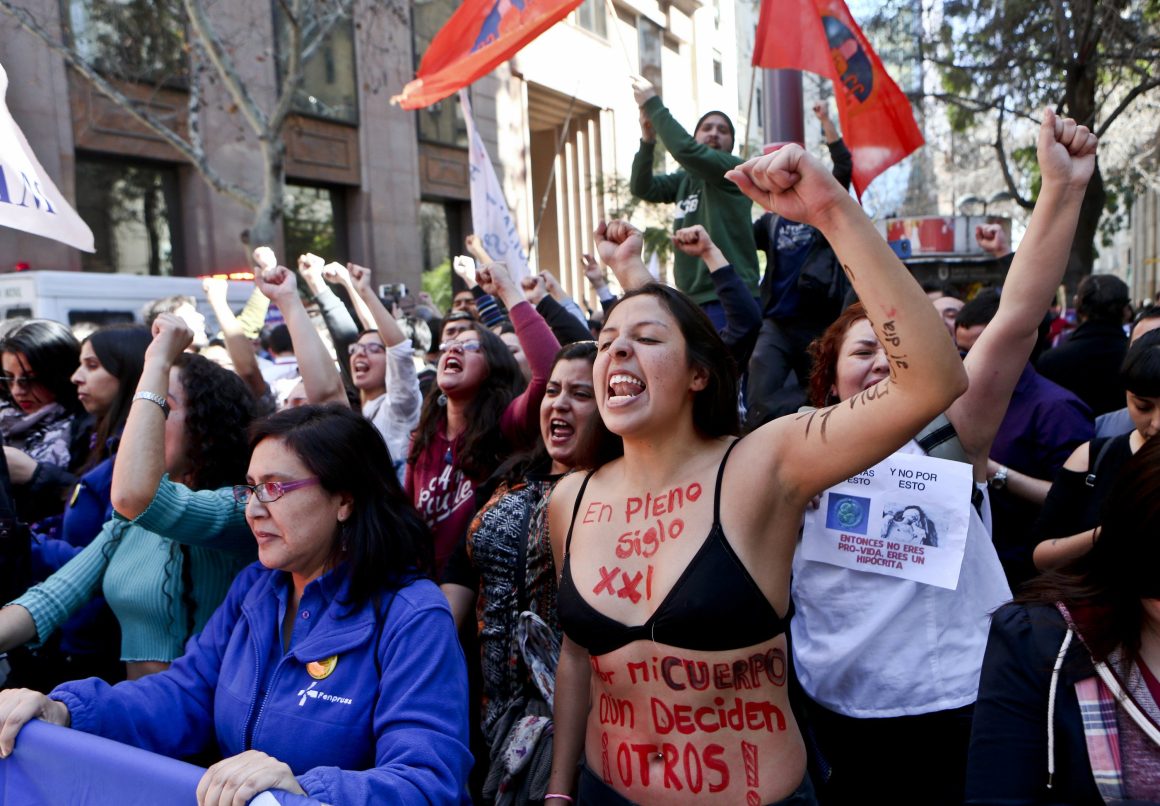By International Socialist Alternative in Chile
Last Thursday night (March 10), the Constitutional Convention (CC), a body elected as part of the process to draw up a new consitution, approved, by 109 votes in favor, 40 against and 5 abstentions, the articles dealing with reproductive and sexual rights. The approval of articles 16 and 17 is no small achievement: so far, of the 50 proposals submitted by the Commission for Fundamental Rights, only 14 have reached the minimum quorum of two thirds. However, general approval does not yet guarantee a definitive victory. There is a long road ahead, in which the organized struggle of women will be the decisive factor in guaranteeing the right to bodily autonomy.
The general approval of articles 16 and 17 expresses the strength of the women’s movement in Chile and Latin America in the last 3 years. It is worth remembering that we have already seen the struggle for the legalization of abortion advance in other Latin American countries. Without the wave of feminist struggles in Latin America, the legalization of abortion would not have been possible in countries such as Argentina, Colombia and Mexico.
In Chile, discussions on the legalization of abortion are framed in terms of its decriminalization under three grounds by the Bachelet government in 2017: risk to the woman’s life, non-viability of the fetus and in the case of rape. Now, after the creation of a Constitutional Convention, it is possible to advance far beyond the limited proposal that the ex-Concertación approved.
During the CC, the #SeraLey initiative was the first proposal with origins in the mass movement to be approved, all thanks to the strength gained by feminist organizations in Chile. It is significant that the approval of articles 16 and 17 came two days after the massive 8M demonstration that saw hundreds of thousands of women take to the streets of Santiago. However, nothing is guaranteed. In the coming days, each article will be voted on separately and that means that specific contents may be deleted or changed.
What was approved?
The vote that took place yesterday approved the popular initiative #SeraLey that includes sexual and reproductive rights as part of the fundamental rights of the new constitution.
Article 16 establishes that all persons are entitled to sexual and reproductive rights. This means that everyone has the right to make free, autonomous and informed decisions about their own body, sexuality, reproduction, pleasure and contraception. The article also establishes that the State must guarantee the exercise of sexual and reproductive rights, access to information, education and health. Therefore, it is incumbent upon the State to provide the conditions to go through pregnancy and childbirth, as well as voluntary termination. Finally, the article emphasizes the need to recognize cultural specificities, as well as the fight against violence during pregnancy, childbirth and maternity.
Article 17 guarantees the right to comprehensive sexual education. Issues such as the free and full expression of sexuality, autonomy, self-care, consent, sexual and emotional responsibility, recognition of multiple identities and expressions of gender and sexuality must be part of the educational process with the aim of eradicating gender stereotypes. The article also affirms secularism and the responsibility of the State to guarantee the right to comprehensive sexual education from early childhood and throughout life.
Victory not yet final: next steps in the struggle
The articles were approved in a general vote. This means that in the next few days each approved article will go through a specific vote. In this process, the content of each article can be modified or even deleted. For example, Article 16 may be approved without the guarantee of the right to abortion.
After the specific voting on the articles, there is still the challenge of getting the new constitution approved by a referendum. It should be recalled that the Constituent Convention process takes place within the framework of the Acuerdo Por la Paz Social y la Nueva Constitución (Agreement for Social Peace and a New Constitution) approved on November 15, 2019. This was a deal made with the Chilean ruling class, one that derailed the mass uprising of 2019 and represented a betrayal of the movement by the political groups around Apruebo Dignidad (the coalition led by Gabriel Boric). The demand for a sovereign Constituent Assembly that arose during the 2019 mass revolt was converted into a mere Constituent Convention, lacking full autonomy and with serious limitations. Therefore, the proposal for a new constitution approved by the CC must be submitted to a referendum in 2022. In this process, the right and extreme right are already campaigning to defend the Pinochet Constitution.
ISA Chile supports all the struggles for articles 16 and 17 to be maintained as they have been approved and, ultimately, we reject any institutional maneuvers during the CC that would imply losses in sexual and reproductive rights. The approval of articles 16 and 17 is part of the struggle to guarantee fundamental rights for the lives of women and LBTQ+ people.
ISA in Chile fights for the approval of the new constitution in the referendum of 2022. Even if the advances approved by the CC are insufficient to definitively overturn the system inherited from the Pinochet dictatorship, its approval would be an important step forward.
However, we also point out that we need to go further. It is not enough to approve the right to abortion without also guaranteeing a financing policy for the construction of public services that allow working class women to receive comprehensive health care. Likewise, comprehensive sex education can only become a reality if the right to a public, free and secular education is guaranteed in the new constitution. If this is not approved, Articles 16 and 17 will be a dead letter.
Ultimately this will require the building of a mass feminist movement that remains mobilized throughout the process of the CC and beyond, linking up with wider struggles of the working class and oppressed in a common fight against Pinochetismo and capitalism.
The struggle has just begun and ISA in Chile will play an active role in it. Part of this is the construction of “ROSA — International Socialist Feminists” as an organizing space for women who resist sexist oppression, machismo and capitalism. We call on everyone to join our ranks and build a Socialist Alternative in Chile.












